The Classroom Semester has the goals of increasing the knowledge and skills of the students, but also giving them a feel for the way the focal issue plays out in the real world, at the local level. It also prepares them for their Practicum projects. This section has notes on class structure, a chart on the underlying philosophy at work, recent syllabi, and information on various instructional techniques currently in use.
Class Structure
-
Each of the three current classes has two instructors; typically, one takes the lead during the classroom semester and one the lead during the practicum semester. This is not necessarily a requirement of the model, but we have found it to work well.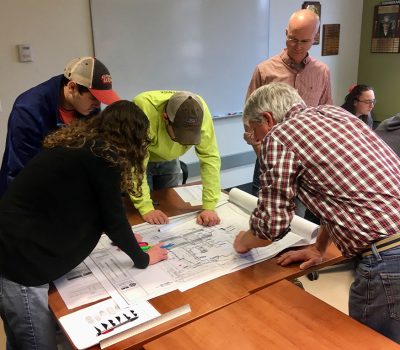
- Both classroom and practicum semesters are 3 credits.
- Classes are limited to about 25 students. Generally, the courses are recommended for juniors and seniors, but this is not a hard and fast rule. None of the classroom courses have prerequisites, although some have recommended preparation; the practicum classes do have the classroom semester as a prerequisite.
- With the support of the NSF grant, each class has a full-time Graduate Assistant. The GA’s are particularly helpful in facilitating the work with towns.
High Leverage Practices
High Leverage Practices (HLPs) are a set of core teaching methods that provide the foundation for the E-Corps approach and a framework for the NSF research effort. Click here to view the most current table of HLP’s assembled by the project research team. An article on the development of the HLPs is here. Also, an overview and individual fact sheets highlighting the HLPs used in each of the three classes are here.Syllabi
The syllabi from the three courses vary considerably. Here are our latest versions in case they are of help to you: Climate Corps classroom syllabus (Fall 2024). Climate Corps practicum syllabus (Spring 2025). Brownfields-Corps-Classroom-Semester-Syllabus (Fall 2024). Brownfields Corps practicum syllabus (Spring 2025). Stormwater Corps Practicum Semester Syllabus (Fall 2024). Stormwater Corps classroom syllabus (Spring 2025).Instructional Techniques
Classes have a strong emphasis on active learning and on fostering interaction between students and between students and instructors. Many instructional techniques focus on promoting interaction and discourse between students, and for this reason class size is limited to about 25 students. Other techniques focus on connecting students to the “real world” through exposure to such things as current events and guest lecturers. A list of E-Corps instructional techniques is below. All three courses do not necessarily use every one of these techniques. Click on the boxes for brief descriptions of the techniques and (if available) a link to examples.
Early / Late Semester Hypothetical Scenarios
These ask the students (individually) to react to a brief (page or less) description of a community situation involving the focus topic. For instance, students are asked to provide advice to a community experiencing stormwater flooding (see below). The exercise takes place in class, allowing perhaps 15 minutes; responses are then revisited at the end of the semester and students asked to enhance, comment, and critique their earlier response. The idea is to give the students a feel for how their thinking on the topic has evolved over the course of the semester, and also to give the instructors a feel for how successful they’ve been.
Guest Lectures from Practitioners
Lecturers are brought in from various sectors involved in the focal issue, for instance from private sector consultants, NGOs, town staff, state regulatory staff, etc. These people talk about what their job entails, what their perspective is on the issue, and any particular problems or issues that they think are important. Time is left for a Q&A session to allow the students to further explore the aspects of the job that interest them.
Attendance at Town Meetings
Students are required as a homework assignment to attend a regular planning, zoning, wetlands, or other town commission meeting, and to write a brief summary of their impressions. This gives the students a feel for the local land use decision making process. [Note: currently only the Climate Corps includes this assignment.]
Role Playing Exercises
These exercises describe, in some detail, a local scenario that has resulted in a town meeting in which town leadership is asking people to provide comment. Each student is assigned a role and has two assignments. The first is a “backgrounder” paper of 2-3 pages on their character, and how they came to their present view of the issue. The second in their actual testimony. (Other students are assigned roles as the town board, and/or as reporters, as class size dictates). Typically with a class of 20-25 it takes 3 class periods to complete the mock town meeting.
Use of Case Studies
Case studies are an effective way to both convey information on the focal topic and to situate it in the real world. Case studies can be the focus of a particular class(es), or sprinkled throughout a number of lectures.
In-Class Team Exercises
These are short exercises that reinforce information included in a recent lecture, usually at the beginning of the same class. Groups of 2-4 students are usually given about 15-30 minutes to finish the exercise, and then the rest of the class is devoted to reporting out by the groups, and subsequent discussion. In some cases like the Pervious Concrete example below, they are an entire class.
Stormwater Corps Group Assignment Pervious Concrete Spring 2023.
Critical Reflection
This is not strictly a classroom semester practice, as it is usually employed at the end of the practicum semester. Students are asked to reflect on their experiences working on a project, including but not limited to: goal of the project, challenges faced, best part of the project, and if the course contributed to short and/or long term professional goals. Each student writes a reflection even if working as part of a team. Two examples from the Climate Corps practicum are below.
Field Visits
This is obviously a well-known technique for grounding the classroom knowledge in the real world, and can sometimes be combined with the “guest lecture” element. As always, transportation logistics can be the limiting factor. The Stormwater Corps is in the enviable position of being able to do all of their field visits on campus, since UConn has a number of innovative stormwater practices located on campus (see a few pics of this below).
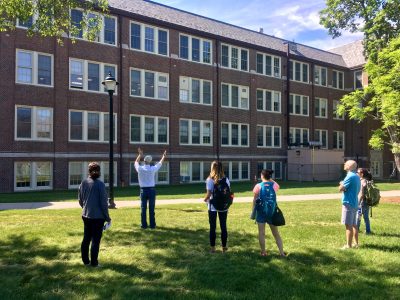
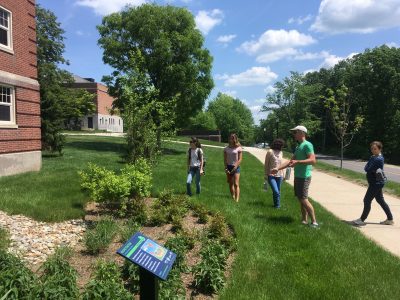
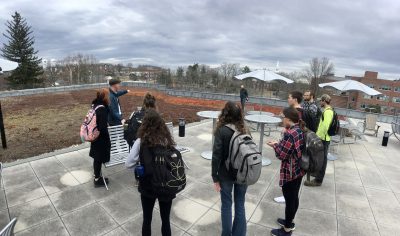
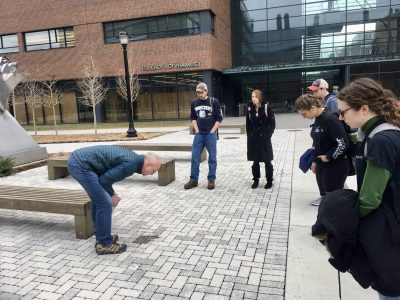
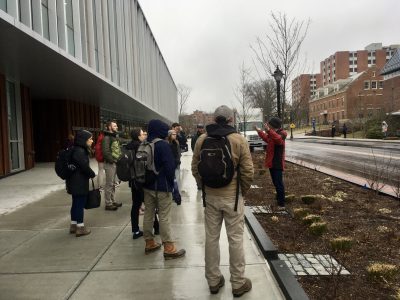
Reading Assignments using Current Events & Media Coverage
These are typically homework assignments where students are asked to find an article in the media that reports on some aspect of the focal issue. They are asked to summarize and comment on the article, in writing and/or as a report in class during discussion.
Team Assignments
All three classes have a major small-team project that serves in lieu of a final exam. In the case of Brownfields Corps, this project extends throughout the semester, in the other two courses the project is more confined to the end of the semester. In many cases, these projects require skills and knowledge that will help to prepare the students for the practicum semester. Climate Corps also has an individual assignment in lieu of its midterm exam (see last entry).
Climate Corps Vulnerability Assessment Final Project Fall 2021
Peer Evaluation
Coming soon...